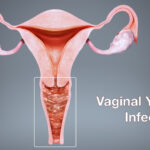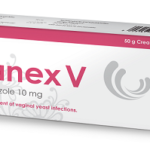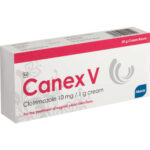Can You Use Home Remedies For Yeast Infections?

What is a vaginal yeast infection?
Vaginal yeast infection, also known as vulvovaginal candidiasis or vaginal candidiasis, is a type of vaginitis, a condition where the vagina is swollen, painful, and creates a discharge. There are several types of vaginitis, each with similar symptoms but vaginal yeast infections are one of the most common. It is the second most common type of vaginal infection after bacterial vaginal infections. An estimated 1.4 million outpatient visits for vaginal candidiasis occur annually in the United States.
Throughout your life, you may experience a vaginal yeast infection several times. Though uncomfortable, these infections are common. A vaginal yeast infection is a condition characterized by burning, itching, redness, and a white discharge from the vagina and vulva. These infections are caused by something that’s already in your body, a fungal body (yeast) called candida. Yeast is a type of fungus and candida is a specific type of yeast. When this yeast is balanced with the ecosystem of your body, there are no problems. But when that balance is disrupted, the yeast rapidly grows and you can get a yeast infection.
A vaginal yeast infection isn’t considered a sexually transmitted infection. But, there’s an increased risk of vaginal yeast infection at the time of first regular sexual activity. There’s also some evidence that infections may be linked to mouth to genital contact (oral-genital sex).
Home Remedies For Yeast Infection That Work
Although medications can effectively treat vaginal yeast infections, there are some effective home remedies that can equally help in the management of this condition. However, If you have recurrent yeast infections four or more within a year, you may need a longer treatment course and a maintenance plan.
The list of effective home remedies for yeast infections include:
Coconut oil: Coconut oil has antifungal properties and has been shown to combat Candida albicans yeast. Raw organic coconut oil can be applied internally or externally to ease symptoms. Warmed coconut oil can also be used as a carrier oil for more powerful antifungal essential oils, including tea tree oil or oil of oregano.
Coconut oil is available to purchase online. Some products may be specifically suited for cooking, rather than for use on skin, so compare products and brands to choose an appropriate product.
Greek yogurt: Probiotics can be effective against C. albicans. Yogurt can be considered a probiotic because it contains live bacteria, such as Lactobacillus acidophilus. These bacteria are essential to creating a healthy environment in your vagina. They can help treat an overgrowth caused by an imbalance.
As confirmed in a 2017 study, eating yogurt helps increase the gut microbiome and can reduce yeast in the body. If you don’t like yogurt, then take probiotics. Probiotics are best taken with food. Plain Greek yogurt is the best kind to use for this home remedy. Make sure that the yogurt doesn’t contain added sugar, which fuels the growth of the Candida fungus.
Apple cider vinegar: Apple cider vinegar has been found to inhibit the growth of Candida albicans, the strain of fungi that typically causes yeast infections. To use this natural remedy, run a bath and add a half cup of apple cider vinegar and soak in the bath for at least 20 minutes.
Never use apple cider vinegar at full strength. Because of apple cider’s ability to kill bacteria and fungi, it could also kill the healthy bacteria in the body. Dilute apple cider vinegar before using it.
Garlic: Garlic is a known antifungal and antibiotic. However, recent research suggests that eating garlic has no effect on the levels of yeast in the vagina. As an alternative to eating garlic, some women have tried using garlic internally. They claim to experience relief from yeast infection, by placing a garlic clove, threaded with a string, into the vagina overnight. While there is no evidence to say this works, it is a low-risk home remedy for yeast infection. People with sensitive skin may experience burning and even skin damage.
As such, people should not use garlic if they have sensitive skin. If the burning sensation worsens, people should discontinue use. Also, a vaginal cream containing garlic and thyme was found to be as effective as clotrimazole vaginal cream in the treatment of yeast infection.
Boric acid: Boric acid vaginal suppositories remedy yeast infections because of boric acid’s antiseptic properties. While research supports the use of these suppositories, it concludes that this should only be used for recurrent and hard-to-treat yeast infections. Because boric acid is so potent, milder treatments should first be used.
Tea tree oil: Tea tree oil is an essential oil that’s used to kill fungi, bacteria, and viruses. Research shows that a vaginal suppository containing tea tree oil may help treat vaginal infections. Tea tree oil has been shown to have antifungal properties.
A recent study also found tea tree oil to be effective as an antimicrobial and in helping break down the biofilm. Tea tree oil is incredibly powerful. Make sure to dilute it with a carrier oil, such as jojoba or coconut oil, if it’s going to touch your skin. Already prepared tea tree vaginal suppositories are the best option.
Only use tea tree oil occasionally, and never swallow it. If you have sensitive skin, do not use tea tree oil. Discontinue use if any discomfort occurs.
Vitamin C: Vitamin C is an immune system booster. A strong immune system allows your body to bring itself back into balance. Vitamin C (also called ascorbic acid) has antimicrobial components, so some women add it to their diet to treat Candida overgrowths.
Try increasing your intake of vitamin C to boost your body’s ability to beat the yeast infection. Do not apply the acidic vitamin C to the sensitive vaginal tissue.
How can I prevent vaginal candidiasis?
Wearing cotton underwear might help reduce the chances of getting a yeast infection. Because taking antibiotics can lead to vaginal candidiasis, take these medicines only when prescribed and exactly as your healthcare provider tells you.





